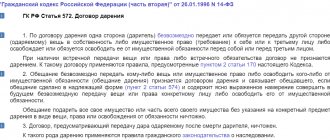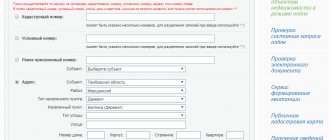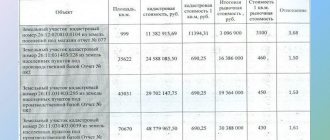Inheritance House Land
11/15/2020 rent, mortgage, loan, snt
A will is a document where the author specifies how his property should be disposed of after death . The testator is the testator, and the one to whom the inheritance is transferred is the heir. You can make a will for any property, be it an apartment, a car or a house with land.
- 1 Features of a will
- 2 Types of wills
- 3 Basic provisions of the will
- 4 Is it possible to bequeath one plot of land without a house?
- 5 List of documents
- 6 Cost
- 7 Scheme for registering a will
- 8 Sample will
- 9 Rules for certifying a will
- 10 When can a written will be used without certification?
- 11 Who is prohibited from leaving without an inheritance?
- 12 Contesting a will 12.1 Related entries
Features of a will
A will is a one-sided transaction. Unlike a sale and purchase, where each party takes an active part in signing the contract, this document is drawn up exclusively by the testator. Moreover, the heir himself may not be aware of the property due until the death of its owner.
The general provisions of the will are described in Art. 1118 Civil Code of the Russian Federation . According to paragraph 3 of this article, the will is drawn up personally by the testator and the document bears his signature.
The testator has the right to rewrite the document as many times as he wants ( Article 1130 of the Civil Code of the Russian Federation ). The last will has legal significance.
It is also noteworthy that separate wills can be drawn up for different types of property. For example, an apartment can be bequeathed to one relative, and a house and land plot can be bequeathed to another. However, these wills must not contradict each other.
Testator's rights
Legal guarantees are disclosed in certain provisions of Chapter. 62 of the Civil Code of the Russian Federation. According to Art. 1119-1121, 1130, 1134, 1135, 1137 and 1139 of the Civil Code of the Russian Federation, the testator has the right:
- independently determine the circle and shares of heirs, disinherit, without motivating your decision;
- cancel and change the will, not inform anyone about the contents and execution;
- draw up several documents, bequeath property that will be acquired in the future;
- appoint a legal or natural person to control the execution of the will;
- provide for actions that the executor can and cannot perform;
- appoint an heir as executor at the expense of inheritance or other compensation.
The text of the document may contain clauses requiring the heirs to perform certain actions of a property or non-property nature, including ritual burial rites. It is possible to transfer obligations for maintaining pets or personal property that is not subject to division.
Types of wills
A will can be open or closed . The open document is available for viewing by the notary, the secretary at the seal, as well as by witnesses, if they are present. The chances of challenging this type of document are almost zero. After all, usually the lawyer himself helps to compile it, so the wording is more than accurate.
As for a closed will ( Article 1126 of the Civil Code of the Russian Federation ), its contents are kept secret. The will of the testator is announced only after his death, and the envelope itself is opened by the notary in front of witnesses.
After writing a closed will, its author packs the document in an envelope and hands it over to a lawyer in the presence of two witnesses who sign. At the same time, the content itself remains secret, both for them and for the notary. Then everything is packed into another envelope.
Basic provisions of the will
The process of registering a will for a house and land is no different from other property. By law, the testator must meet certain criteria:
- the sole owner of the bequeathed property;
- capable, aware of his actions and responsible for his actions;
- adult.
The testator has the right not only to transfer his property to whomever he wants, but also to deprive the right of inheritance of persons claiming it by law (with the exception of those who are on the mandatory list). You can enter into an inheritance 6 months after the death of the former owner.
If, when drawing up a will, it is not possible to contact a notary, the following persons can replace him:
- the head physician of the medical institution, if the testator is undergoing treatment there;
- the head of the penitentiary institution when the testator is the convicted person;
- director of a nursing home, if the testator lives there, and others.
However, when contacting a notary's office, there is a greater likelihood that the will will be drawn up correctly, in accordance with established legal standards.
Is it possible to bequeath one plot of land without a house?
If we consider a house and a plot of land from a legal point of view, they are different objects of real estate. Each of them is registered separately in Rosreestr and has its own extract from the Unified State Register of Real Estate.
Theoretically, it is possible to make a will only for a house or land. But if you look from the other side, in Art. 35 of the RF Land Code states that when ownership of a structure is transferred, the right to dispose of the land is simultaneously transferred.
One way or another, the heir will be able to legally own the house only when this is stipulated in the will. If only the land is given to him, he is the owner only of its resources.
To avoid confusion, lawyers advise that the land plot adjacent to it be marked at the same time. If there are several heirs, it is better to divide both properties in equal shares.
Documents for a will for a house and land
The testator is obliged to provide the notary with a passport. The notary has no right to demand confirmation of ownership of the specified property and valuables. However, in order to identify objects and avoid misunderstandings, it is additionally recommended to have with you:
- agreement of donation, exchange or sale of a house;
- certificate of state registration of real estate;
- confirmation of ownership of a land plot with a cadastral plan reflecting the location of communications;
- a certificate of the inventory value of the property taken from the BTI;
- a certificate confirming that the testator was not officially married at the time of acquisition of the property, otherwise ½ of the property is the property of the legal spouse;
- a certificate of mental health, which will prevent the will from being invalidated in the event of disputes between the heirs.
The testator can inherit a dacha with a plot, and it is necessary to provide documents taken from the BTI: cadastral extract and plan, certificate of ownership and calculation of the cadastral value of the land plot and buildings.
The notary may recommend attaching additional documents to facilitate the process of transferring real estate after the opening of the inheritance.
List of documents
To make a will, you need to contact a notary office and take with you the following list of documents :
- passport;
- title document for the house and land (extract from the Unified State Register of Real Estate, purchase and sale agreement, etc.);
- technical passport (or cadastral plan);
- passports or birth certificates of heirs.
In fact, the testator himself will not need anything else. As for the heirs themselves, when entering into an inheritance they will have to collect a more substantial package of documents.
Pros and cons of a gift agreement
| For the donor | For the recipient | |
| pros | the possibility of applying a suspensive condition upon entry into force of the contract. | the right to property comes immediately after signing the contract; the high complexity of challenging the procedure in court; no tax payments when donating to close relatives. |
| Minuses | the donor cannot set his own conditions for the donee; To cancel a donation, a court decision is required, for which serious grounds are required. | When transferring a house to a third party, the recipient is obligated to pay a tax of 13%. |
Scheme for registering a will
As mentioned above, the testator has the right to independently choose which notary to contact. However, it is advisable to choose an office according to the dream of residence or placement of the property being transferred.
The scheme for drawing up a will for a house and land consists of the following stages:
- Design of the text itself , which indicates the data of the testator and heir, and also describes the transferred property. It is also possible to place restrictions on the right of individuals to inherit property, even if it is legally theirs. In other words, the testator expresses his will in the text of the document.
- After the will has been drawn up, its contents need to be checked . These responsibilities are assigned to the specialist.
- Certification of a will.
The document is drawn up in two copies: the first remains with the author of the will, the second with the notary.
The scheme for drawing up and verifying an open will is described above. A closed form of document is drawn up without the participation of lawyers. The notary only participates in the certification of the document sealed in the envelope.
Price
If the testator is in prison, in a hospital, social center or other institution where a disposition in the event of death is drawn up and certified, all services for registration and certification are provided free of charge and nothing needs to be paid. A different picture emerges with notarization.
An independently drawn up legal will, which only needs to be certified by a notary, requires its maker to pay from 100 rubles, depending on the locality and the status of the notary’s office. If the text is drawn up illiterately, with grammatical, technical, or legal errors, or when the testator turns to a notary for help in drawing up a document, the cost of services increases. In this case, you will have to pay at least 1,000 rubles.
The state duty, which is 3% of the value of the property for close relatives and 6% for other heirs , is not charged to the testator. It will be paid by the persons who inherited it.
This amount is charged equally from the order in which the rights to land only, or to land with a house, are transferred. That is, there is no difference in the payment for drawing up a will for one or two immovable objects - the cost of a notary service is determined by the number of documents, and not the objects included in their text.
Sample will
The contents of the will for the house and land consist of the following data:
- date and place of compilation;
- personal data of the compiler (full name, address, etc.);
- main text (the will of the testator, that is, to whom he transfers his property after death and in what quantities);
- instructions to clarify the contents of Art. 1149 of the Civil Code of the Russian Federation , which describes the right to an obligatory share in the inheritance;
- signature of the author of the document;
- instructions from the lawyer to verify the identity of the testator , as well as payment of the state duty, the presence of an entry in the register ;
- notary's signature and seal.
sample will for a house and land.
The notary is obliged to keep the contents of the will secret and not disclose it until the death of the applicant.
Which heirs, including close relatives, cannot be excluded?
Since a citizen bears the burden of supporting his minor children, he cannot limit their right to claim part of the inheritance.
The remaining categories of persons entitled to a compulsory share are established in Art. 1141 of the Civil Code of the Russian Federation. Among them:
- disabled children regardless of group and age;
- family members who have reached pre-retirement (55, 60 years) and retirement age;
- adult but disabled children;
- disabled spouse and parents;
- persons living with the author of the will for at least 1 year and who are dependents.
Disability, age and period of residence are established on the day of opening of the inheritance. Mandatory heirs include both biological children and parents, as well as adoptive parents/guardians and adopted children in accordance with the law.
Rules for certifying a will
According to general rules, a notary is required to certify a will. However, in some cases this may be done by other persons. This is only possible when it is impossible to contact a lawyer for reasons beyond the control of the testator ( clause 7 of Article 1125 of the Civil Code of the Russian Federation ).
Let's consider several situations. A sailor is on a ship and wants to make a will. The captain can assure him. If we are talking about the military, then these obligations are transferred to the commander of the military unit. If a sailor or military man is away from the ship or military unit, they are required to contact a notary when drawing up a will. In this case, other persons cannot become his replacement.
A complete list of persons who can replace a notary when certifying a will is stipulated in Art. 1127 Civil Code of the Russian Federation .
When can a written will be used without certification?
There are situations when a person cannot contact a notary’s office or other persons to have a will certified. We are talking about emergency circumstances. In such cases, he may write the document by hand and not certify it.
It is important to understand that this is allowed only in the most extreme cases. These include the presence of the testator in a war zone, a natural disaster, etc. More details about this in Art. 1129 of the Civil Code of the Russian Federation.
A will is recognized as valid if it is drawn up in the presence of two witnesses and written in one’s own hand.
Who is prohibited from leaving without an inheritance?
The law stipulates certain categories of citizens who are included in the liver having an obligatory share in the inheritance. These include:
- disabled persons who were dependent on the deceased and lived with him in the same house;
- children under 18 years of age;
- incapacitated disabled people;
- elderly parents.
Not only do these categories of citizens have a mandatory right to inheritance, but by law they are also entitled to at least half of the deceased’s property.
How to insure yourself in advance and what you need to consider
As a conclusion, I would like to say a few more words. You are not obliged to explain to anyone who you are leaving your property to and why. It's yours, not your children's or spouse's. You have the right to make any transactions yourself.
If you want, give it to the state, an outsider or a charitable organization. Of course, you cannot completely disinherit a spouse with a disability or a child who has not reached the age of majority.
Therefore, take care of this in advance. Just in case, do not forget to collect the documents mentioned above. Otherwise, the procedure should not cause any problems.
Contesting a will
Anyone who is somehow related to the testator has the right to challenge a will through the court. If a person believes that his rights have been violated, he should file a claim and seek justice in court. The reasons why a will is declared invalid are specified in Art. 1131 Civil Code of the Russian Federation.
The grounds for challenging a will are:
- the heirs were declared incompetent and they cannot dispose of the inherited property ( Article 1117 of the Civil Code of the Russian Federation );
- the will was drawn up with violations that are contrary to legal norms;
- the testator was under pressure when drawing up a will, or he was under the influence of certain drugs and was not aware of his actions;
- the will does not take into account the rights of socially vulnerable categories of citizens.
In any case, the will will have to be contested in court.








